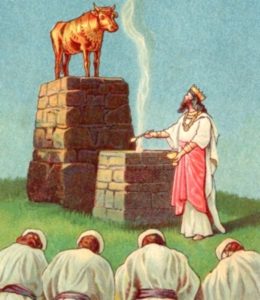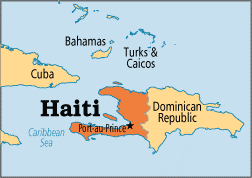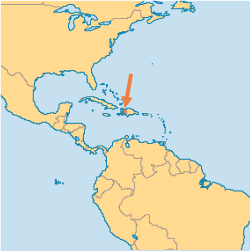SOLOMON’S APOSTASY; SAUL’S CONVERSION and PRAYER FOCUS ON HAITI
Solomon was the son of David appointed to rule on his father’s throne and to build the temple his father desired. He had great wisdom, honor, wealth, and power, all gifts from God. As we have seen, unlike Jesus, the Greater Son of David, Solomon’s wisdom did not extend to his moral and spiritual life. Solomon did not remain humble. Nor did he always put to good use what God had given Him. His judgment became distorted.
Those who grow in riches, fame and power of influence can fall into self-deception, thinking that ‘might makes right’. They forget that moral and spiritual laws apply to themselves. Their transgressions reap a harvest of consequences. Many at the height of their success become blind to the moral precipices beneath their feet of clay.
Jesus puts Solomon’s earthly splendor into perspective as He contrasts it with the splendor of the Father’s plan in the Sermon on the Mount:
Matthew 6:28-29 “And why are you worried about clothing? Observe how the lilies of the field grow; they do not toil, nor do they spin, [29] yet I say to you that not even Solomon in all his glory clothed himself like one of these.”
The queen of Sheba sought out Solomon for his wisdom. Jesus tells us that there is a greater wisdom that is to be found in God’s wisdom, His plan of salvation:
Matthew 12:42 “The Queen of the South will rise up with this generation at the judgment and will condemn it, because she came from the ends of the earth to hear the wisdom of Solomon; and behold, something greater than Solomon is here.
If the Queen of Sheba was responsive to the wisdom God gave Solomon, how much more should we be responsive to the wisdom of God in giving us the greater Son of David, Jesus Christ to be our Lord and Savior? If she was willing to give up her time and take the trouble to travel to a far country to investigate the claims made concerning Solomon, how much more should we be willing to sacrifice and come to Christ and deepen our relationship with Him!
Solomon’s glory is severely tarnished as his heart is turned away from the Lord. His prophetic voice disappears. His spiritual credibility is undermined. He fails to seek the Lord and do what is pleasing in His sight. Notice the declension. He treats unfairly those who had been generous towards him (9:12-13). He oppressed foreigners into forced labor (9:15-22). He violates God’s law to accumulate wealth (10:26-29) and takes foreign wives who lead him into idolatry (1 Kings 11).
Notice that he does all that is forbidden in the law of Moses pertaining to kings:
Deut. 17:16-17 “Moreover, he shall not multiply horses for himself, nor shall he cause the people to return to Egypt to multiply horses, since the Lord has said to you, ‘You shall never again return that way.’ [17] “He shall not multiply wives for himself, or else his heart will turn away; nor shall he greatly increase silver and gold for himself.”
1 Kings 11 tells us how Solomon’s heart is turned.
1 Kings 11:1-3 Now King Solomon loved many foreign women along with the daughter of Pharaoh: Moabite, Ammonite, Edomite, Sidonian, and Hittite women, [2] from the nations concerning which the Lord had said to the sons of Israel, “You shall not associate with them, nor shall they associate with you, for they will surely turn your heart away after their gods.” Solomon held fast to these in love. [3] He had seven hundred wives, princesses, and three hundred concubines, and his wives turned his heart away.
Solomon had exhorted the people to be “wholly devoted to the Lord” and “keep His commands” (1 Kings 8:61). Yet he became more devoted to his wives than to God. He disobeyed God’s commands, and both accommodated and entered into their idolatry. Solomon’s example of marrying women from pagan nations set in motion a practice that would cause great problems centuries later during the time of Ezra and Nehemiah (Ezra 9:2; 10:2-3; Neh 13:23-27).
The Lord appears to Solomon for the last time with this sad verdict. His warnings have gone unheeded.
1 Kings 11:11-13 11 So the LORD said to Solomon, “Because you have done this, and you have not kept My covenant and My statutes, which I have commanded you, I will surely tear the kingdom from you, and will give it to your servant. 12 “Nevertheless I will not do it in your days for the sake of your father David, but I will tear it out of the hand of your son. 13 “However, I will not tear away all the kingdom, but I will give one tribe to your son for the sake of My servant David and for the sake of Jerusalem which I have chosen.”
The consequences of Solomon’s apostasy would be that the kingdom would be divided, with ten tribes forming the nation of Israel to the north, and two tribes forming the nation of Judah in the south. The kingdom would have been torn out of his hands completely if it were not for God’s previous covenant with David and His choice of Jerusalem.
Solomon’s golden age of peace is over. God raised up enemies against Solomon. Hadad, the Edomite, whose people had been killed by David’s army under the command of Joab. Haddad survived, fleeing to Egypt where he was sheltered with favor by Egypt’s Pharaoh. When Hadad learns that Joab is dead, he asks Pharaoh’s permission to leave and attack Solomon. Rezan of Aram also attacked Solomon.
A servant of Solomon, Jeroboam, son of Nebat, an Ephraimite, and son of Zeruah, rebelled against Solomon.
1 Kings 11:28 28 Now the man Jeroboam was a valiant warrior, and when Solomon saw that the young man was industrious, he appointed him over all the forced labor of the house of Joseph.
The prophet Ahijah encourages Jeroboam to rise up against Solomon by assuring him that it was the LORD who was going to give him the ten northern kingdoms (1 Kings 11:29-39).
1 Kings 11:30-33 30 Then Ahijah took hold of the new cloak which was on him and tore it into twelve pieces. 31 He said to Jeroboam, “Take for yourself ten pieces; for thus says the LORD, the God of Israel, ‘Behold, I will tear the kingdom out of the hand of Solomon and give you ten tribes 32 (but he will have one tribe, for the sake of My servant David and for the sake of Jerusalem, the city which I have chosen from all the tribes of Israel), 33 because they have forsaken Me, and have worshiped Ashtoreth the goddess of the Sidonians, Chemosh the god of Moab, and Milcom the god of the sons of Ammon; and they have not walked in My ways, doing what is right in My sight and observing My statutes and My ordinances, as his father David did.
Therefore Solomon tried to kill Jeroboam, but Jeroboam escapes to Egypt where he is provided refuge until Solomon’s death.
Solomon dies after a 40-year reign.
The northern kingdom would soon be led by Jeroboam.
So, due to the unfaithfulness of Solomon and the people, the promised judgment is falling upon God’s covenant people with the kingdom being divided. Jeroboam will become king of the ten northern tribes (Israel) and Solomon’s descendants will be rulers over the territories of Judah and Benjamin, to be known as the southern kingdom (Judah).
The Lord promises to Jeroboam the same promises that He gave to David, with the difference that there was a shelf-life to them, as God intended to establish the kingdom of the son of David forever, and Jeroboam’s only for a limited time. He would do this for the purpose of humbling David’s descendants (1 Kings 11:39).
Solomon tries to kill Jeroboam, who flees to Egypt and remains there until Solomon’s death.
Out of mercy, the Lord allows Solomon to remain on the throne in Jerusalem throughout his life. But the Lord says (through the prophet):
1 Kings 11:35-36 35 but I will take the kingdom from his son’s hand and give it to you, even ten tribes. 36 ‘But to his son I will give one tribe, that My servant David may have a lamp always before Me in Jerusalem, the city where I have chosen for Myself to put My name.
Solomon’s successor, King Rehoboam, forsakes the counsel of the elders and gives in to the advice of his peers to be even more of a tyrant than his father.
1 Kings 12:13-15 The king answered the people harshly, for he forsook the advice of the elders which they had given him, [14] and he spoke to them according to the advice of the young men, saying, “My father made your yoke heavy, but I will add to your yoke; my father disciplined you with whips, but I will discipline you with scorpions.” [15] So the king did not listen to the people; for it was a turn of events from the Lord, that He might establish His word, which the Lord spoke through Ahijah the Shilonite to Jeroboam the son of Nebat.
So begins a period of approximately sixty years from the death of Solomon and the breakup of the kingdom to the corrupt reign of Ahab and the coming of the prophet Elijah.
We see in the despotic reign of Solomon in his later years and the rule of Rehoboam, that people often submit to tyranny rather than rise up against it.
NEW TESTAMENT READING: Acts 9:1-25
Today we have Luke’s account of the conversion of the Apostle Paul. We will read it again in the Book of Acts as Paul repeats his testimony on at least two other occasions (Acts 22 and 26). This is another great evidence of the reality of Jesus’ resurrection- the transformation of the Apostle Paul.
We meet Paul as Saul of Tarsus, consenting to the death of Stephen (Acts 7:58). Then we see him as a prime persecutor of the church (Acts 9:1). He was one of those religious zealots from the synagogue that Jesus spoke about in the upper room before he was crucified:
John 16:2-3 2 “They will make you outcasts from the synagogue, but an hour is coming for everyone who kills you to think that he is offering service to God. 3 “These things they will do because they have not known the Father or Me.
The conversion of Saul to Paul is one of the greatest stories in the history of the church.
Damascus, a city in Syria, northeast of Jerusalem, had a large Jewish population and it is estimated that it had as many as thirty or forty synagogues.
Paul made some important discoveries that day. Jesus is real! Jesus is alive! Jesus loves his church and is so identified with believers that He says to Saul when He stops him in his tracks on the road to Damascus: “Saul, Saul, why do you persecute me?” Christ is united and identified with His church. It is His body. To persecute the church is to persecute Christ.
Paul discovered that he was a sinner and needed a Savior. He realizes that he had been blinded and mistakenly thought that Jesus was a blasphemer and false teacher. Now He realizes Jesus is the Son of God. Saul’s sin was not just that he persecuted the church, but that he was persecuting the God he thought he was serving!
Paul also discovered that the church of the Lord Jesus was God’s special family. He is introduced to Ananias who is directed by the Lord to go to Saul, whom he formerly perceived as an enemy of the church, and pray for him (Acts 9: 10-14).
Paul also discovered that God had a great purpose for him:
Acts 9:15-16 15 But the Lord said to him, “Go, for he is a chosen instrument of Mine, to bear My name before the Gentiles and kings and the sons of Israel; 16 for I will show him how much he must suffer for My name’s sake.”
Paul describes the Lord commissioning him:
Acts 26:16-18 16 ‘But get up and stand on your feet; for this purpose I have appeared to you, to appoint you a minister and a witness not only to the things which you have seen, but also to the things in which I will appear to you; 17 rescuing you from the Jewish people and from the Gentiles, to whom I am sending you, 18 to open their eyes so that they may turn from darkness to light and from the dominion of Satan to God, that they may receive forgiveness of sins and an inheritance among those who have been sanctified by faith in Me.’
TODAY’S PSALM: PSALM 131:1-3
PSALM 131:1-3
This Psalm eloquently speaks of the benefit of humbling ourselves before the Lord.
O Lord, my heart is not proud, nor my eyes haughty;
Nor do I involve myself in great matters,
Or in things too difficult for me.
Surely I have composed and quieted my soul;
Like a weaned child rests against his mother,
My soul is like a weaned child within me.
O Israel, hope in the Lord
From this time forth and forever.
Warren Wiersbe sums up David’s accomplishments well.
“A courageous soldier, a gifted general and tactician, and a sincere man of God, it was David who defeated Israel’s enemies, expanded her boundaries, and amassed the wealth that Solomon used to build the temple. He wrote nearly half of the psalms, and though (like all of us) he was guilty of disobeying the Lord, he was always repentant and sought God’s merciful forgiveness. It was for David’s sake that the Lord kept the light burning in Jerusalem during the years of Judah’s decay, and it was from David’s line that Jesus Christ came into this world. Except for a few lapses into selfishness and sin, David walked with the Lord in a humble spirit.” (Bible Exposition Commentary (BE Series)- Old Testament
David also had a lot to be humble about! He knew he was a great sinner. But like John Newton he could say, “I have a great Savior!”
The opening verses remind me of the words of the Apostle Paul:
Romans 12:3 3 For through the grace given to me I say to everyone among you not to think more highly of himself than he ought to think; but to think so as to have sound judgment, as God has allotted to each a measure of faith.
Psalm 131:1 1 O LORD, my heart is not proud, nor my eyes haughty; Nor do I involve myself in great matters, Or in things too difficult for me.
David is aware of the dangers of reckless ambition. Jeremiah warns:
Jeremiah 45:5 5 ‘But you, are you seeking great things for yourself? Do not seek them; for behold, I am going to bring disaster on all flesh,’ declares the LORD, ‘but I will give your life to you as booty in all the places where you may go.'”
We need to be content with who the Lord has made us to be, thanking Him for our portion in Christ. We need to appreciate the fact that we are part of a story and a community of which we are not the center!
Romans 12:4 4 For just as we have many members in one body and all the members do not have the same function,
Psalm 131:2 2 Surely, I have composed and quieted my soul; Like a weaned child rests against his mother, My soul is like a weaned child within me.
The Hebrew word for ‘wean’ means to complete, to ripen, to treat kindly. The English word may be a contraction of the Scottish word for a dependent babe, a ‘wee one’. We can be near our mother, but not demanding out of dissatisfaction. We are content with who we are and what we have in Christ. A spiritual child moves from constant feeding and early dependence on our spiritual parents through a process of individuation (recognizing their unique gifts, calling and portion in Christ) and then interdependence in the household of faith.
Our dependence upon the Lord never ceases.
Psalm 131:3 3 O Israel, hope in the LORD From this time forth and forever.
TODAY’S PROVERB- PROVERBS 17:4-5
These Proverbs touch upon the impact of listening to evil speech and mocking the poor or taking pleasure in the difficult circumstances of others.
Proverbs 17:4-5 4 An evildoer listens to wicked lips; A liar pays attention to a destructive tongue. 5 He who mocks the poor taunts his Maker; He who rejoices at calamity will not go unpunished.
When we examine the life of David, the Psalmist, we realize that there are many things that he might be tempted to boast about. From humble origins, voted by his family as least likely to succeed, God promotes him to be Israel’s king, founder of a dynasty that will bring forth the Messiah.
PRAY FOR THE NATIONS
(Taken from the Prayer Guide- OPERATION WORLD)
Haiti
Republic of Haiti
Caribbean
Geography
Area: 27,400 sq km
Western third of the island of Hispaniola; shared with the Dominican Republic.
Population: 10,188,175 Annual Growth: 1.60%
Capital: Port-au-Prince
Urbanites: 49.6%
HDI Rank: 149 of 182 (UN Human Development Reports 2009)
Official language: French (10% speak it). Common languages Haitian Creole, English and Spanish increasingly used as a second language Languages: 2All languages
Haiti is the poorest state in the Western Hemisphere, aggravated by overpopulation, deforestation (only 2% of original forests remain), soil erosion, pollution and hurricanes. Around 75% live on less than $2 a day, and two thirds are under- or unemployed. Political instability and violence prevent proper aid distribution and long-term investment. The 2010 earthquake devastated much of what little economic infrastructure did exist. After this disaster it will take billions of dollars and many years of stability, coupled with sustained redevelopment, to see any long-term economic progress. Major sources of income include remittances from expatriate Haitians and, now, aid, relief and development funds earmarked for earthquake recovery.
POLITICS-
A slave revolt against the French in 1804 created the first black republic in the world. Haiti was made to pay for its freedom with steep reparations to France and economic/diplomatic isolation by the European and American imperial powers, crippling the nation in its early years. Since then, it has had a troubled history of bloodshed and dictatorships. The deposing of the Duvaliers in 1986 ended a particularly brutal dictatorship. A succession of coups and military governments since, including US led intervention in 1994, have done little to instill stability, but the longer-term presence of the UN has assisted. Haiti annually appears at or near the top of the corruption index; crime is rife, and 25% of the already-under-strength police force are in the pockets of drug lords and gangs.
Answer to Prayer
The spiritual response to the tragedy of the 2010 earthquake was an almost universal outpouring of prayer, repentance and calling upon God for mercy and deliverance. Out of the disaster, God appears to be doing something radical and new among the people of Haiti. Reports abound that the three days of prayer and fasting called for by the president – replacing February 2010’s Mardi Gras – were attended by over one million people.
Challenge for Prayer
The earthquake of 2010 was a disaster on many levels. But it also offers hope out of tragedy. It is believed that 230,000 lost their lives, 300,000 were injured and over one million were rendered homeless. Hundreds of thousands of homes and buildings were also destroyed, including some major government buildings. Aid arrived from around the world, but coordination was difficult in the aftermath of the earthquake, and assistance will be needed for a long time to come. For a host of reasons, Haiti struggled as a nation from its very inception. This shattering disaster could be an opportunity to reshape not just the physical infrastructure of the nation, but the cultural, economic, political and societal infrastructures as well. Some points to cover in prayer include:
- a) The rebuilding efforts will take years. Haiti’s infrastructure was never good, and Port-au-Prince’s was especially weak due to rapid urbanization from poorer rural areas. Countless homes will need to be rebuilt or restored; the sheer scale of money and manpower needed is staggering for the Western Hemisphere’s poorest nation. Pray for the best long-term development for the city and nation, rather than quick fixes. Pray for generous assistance from wealthier neighbors and nations and agencies from further abroad.
- b) The human suffering was immense in the immediate aftermath and will continue for years. The shared emotional trauma of the events, the massive loss of life and the long-term injuries will all leave major scars on the Haitian population. Healing from such hurts needs time, care and the love of God.
- c) Haiti was a financial and social mess even before the earthquake. Repairing all the damage, however, will not create a healthy economy. Haiti must rebuild beyond its previous state and develop long-term plans and policies that are shaped with wisdom and justice.
Pray for the many ministries that are working with the poor in Haiti, including, “Hope for the Children of Haiti” and “Orphans First”.
PRAYER: Father, we thank you for the gospel, the ‘sure mercies of David’. So often we fail to give you the worship and obedience that You deserve. We are great sinners. But we have a great Savior! We thank you for Jesus! He is the eternal king who reigns in righteousness and He has offered us riches that make Solomon’s wealth look like cheap trinkets. You have attired us with the righteousness of Christ and granted us the inheritance He attained for us!
We pray that we would step into our calling with the kind of abandon that the Apostle Paul demonstrated. May You be glorified in all that we say and do!
-Pastor David
So, naturally, we proclaim Christ! We warn everyone we meet, and we teach everyone we can, all that we know about him, so that, if possible, we may bring every man up to his full maturity in Christ. (Colossians 1:28, J.B. Phillips paraphrase)
New Life Community Church, Concord, MA 10742
www.newlife.org
